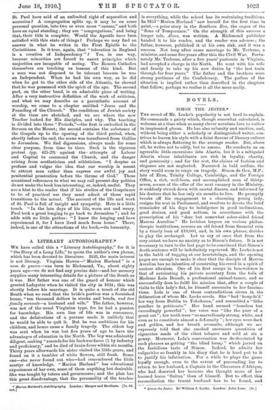A LITERARY AUTOBIOGRAPHY.*
WE have called this a "Literary Autobiography," for it is " the Story of a Long Life," to quote the author's own phrase, which has been devoted to literature. Still, the main interest is not literary. Virginia Hawes—" Marion Harland " is a nom. de guerre—was born in Richmond, Va., about eighty years ago—we do not find any precise date—and her memory supplies many interesting details for a picture of the South as it was. Her father was one of the guard of honour which greeted Lafayette when he visited the city in 1824; this was shortly before his marriage. It is quite a touch of the old South when we read that the bride's portion was a furnished house, "ten thousand dollars in stocks and bonds, and two family servants—a husband and wife." The father, however, was not of the usual Virginian type, for he had a passion for knowledge. His own line of life was in commerce, and the defalcations of a partner made it unlikely that he would be able to quit it. But he was ambitious for his children, and hence came a family tragedy. The eldest boy was sent when he was but five years of age to have the advantages of education in the North. The boy was admirably diligent, making "amends for his backwardness (!) by industry and proficiency," and he died of brain-fever within six months. Thirty years afterwards his sister visited the little grave, and found on it a tumbler of white flowers, still fresh. Some one—she never found out who—had remembered the little martyr of knowledge. " Marion Harland" has educational experiences of her own, some of them anything but desirable. She was taught by tutors and governesses ; and the plan has this great disadvantage, that the personality of the teacher
• Marion Harland's Autobiography. London ; Harper and Brothers. [7s. 6d.
net.] -
is everything, while the school has its restraining traditions. In 1853 "Marion Harland" saw herself for the first time in print,—a prize story in the Southern Era, the organ of the " Sons of Temperance." On the strength of this success a longer tale, Alone, was written. A Richmond publisher handed it to his reader, and the reader was adverse ; the father, however, published it at his own risk, and it was a success. Not long after came marriage to Mr. Tcrhune, a minister, and some five years after this the Civil War. Fortu- nately Mr. Terhune, after a five years' pastorate in Virginia, had accepted a charge in the North. He went with his wife and family to take up his new duties by "the last train through for four years." The father and the brothers were strong partisans of the Confederaoy. The pathos of the situation is implied rather than described in the chapters that follow; perhaps we realise it all the more easily.










































 Previous page
Previous page